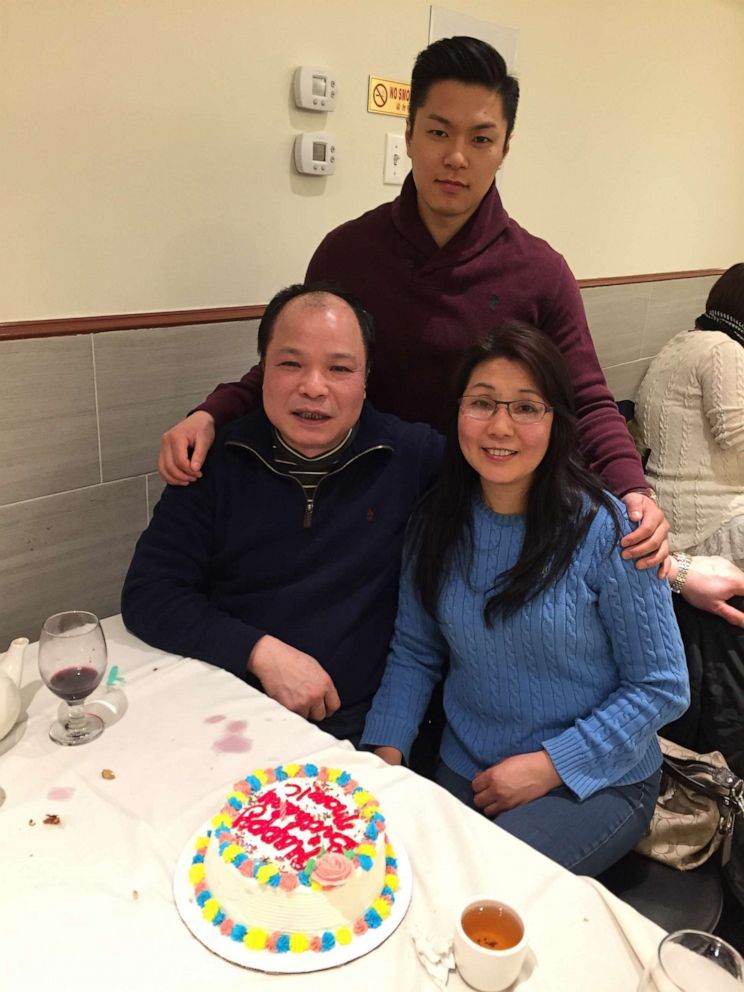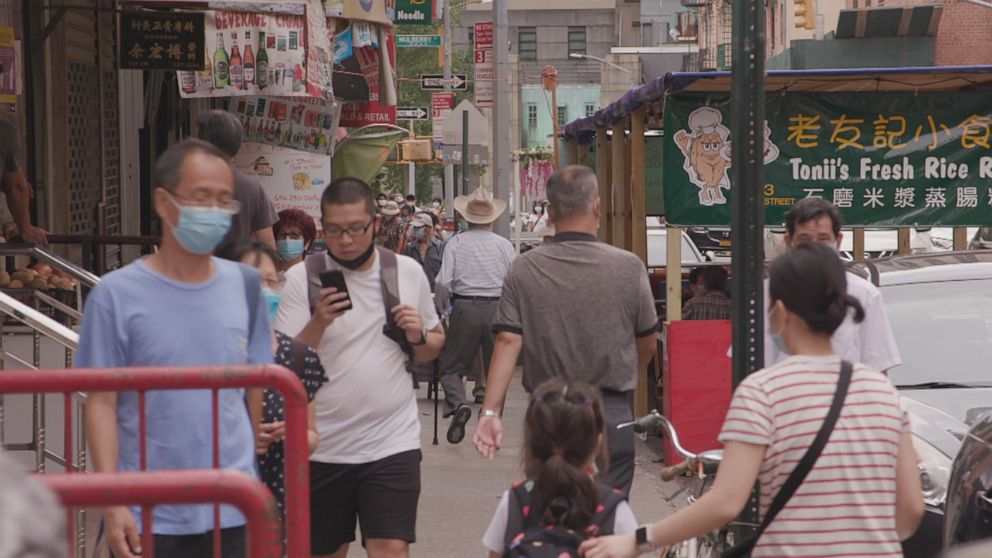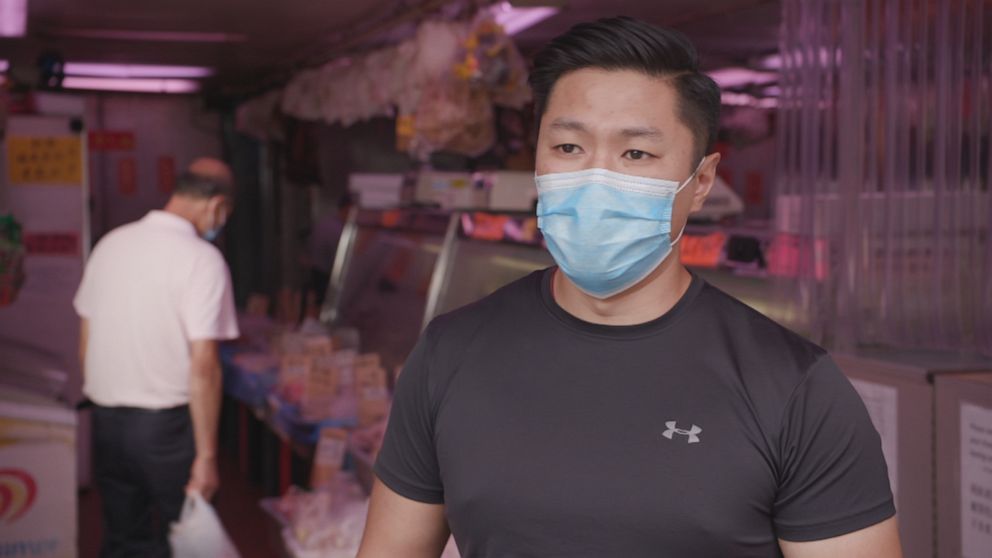Community left behind: Asian American businesses affected by COVID-19
Asian American unemployment has quadrupled since the pandemic hit.
This report is part of "Turning Point," a groundbreaking month-long series by ABC News examining the racial reckoning sweeping the United States and exploring whether it can lead to lasting reconciliation.
Jefferson Li is the American dream fulfilled. The Coast Guard reservist is the son of Chinese immigrants who worked hard for 25 years building their butcher shop in New York City’s Chinatown.
“We cater mostly to the local community ... mostly elderly Chinese folks,” Li said of the shop.
Now, Li’s back home to help his family business survive amid a global pandemic that’s killing Asian American-owned businesses.
Li’s parents speak little English and came to the U.S. solely to provide a better life for their children. Now, the family is facing unprecedented challenges.
“A lot of our parents when they came here they worked low-wage jobs, really bottom-of-the-barrel jobs,” he said. “As parents, they always tell us, ‘We're doing it so that you don't have to do it. You can get a better job. And you can have a better future.’”

While Asian families like Li’s are struggling to hold on, President Donald Trump has continued to tout positive trends for employment numbers.
That success has not been shared by American minorities -- economically, they remain the hardest hit. The unemployment rate for Asian Americans has spiked to record highs.
It’s a drastic change from before the pandemic, when the demographic had the lowest unemployment rate across the board, at just 2.5%.
Today, Asian American unemployment has more than quadrupled to 10.7%. Black Americans are the only demographic with a higher unemployment rate.
Racist rhetoric from the White House likely hasn’t helped, with Trump repeatedly referring to COVID-19 as “the China virus.”
The backlash over the origin of the novel coronavirus has made recovery for Asian-owned businesses like the Li’s nearly impossible.
“National leadership kept referring to it as ‘the Chinese virus’ or ‘the China virus,’” Li said. “Of course with that kind of name, Chinatown and the people that live and work here are going to be associated with it.”
Now, a new report from consulting firm McKinsey reveals just how detrimental the rhetoric has been on this group of Americans. Harrison Lung, one of the authors of the report and a partner at the firm, has been researching and analyzing how Asian Americans have been affected by COVID-19.
“Our data suggests that Asian Americans are hampered across the entire country, whether it's on the East Coast, the West Coast, the Midwest,” Lung said. “When we looked at the data, there has been [an] outsized impact on this community.”
A report by the National Council of Asian Pacific Americans shows Li’s family shop is one of nearly 2 million small businesses owned by this demographic across the country. These businesses employ more than 3.5 million people -- and many are now struggling to access financial relief.
“Our analysis should suggest about 75% or three-quarters of these businesses are not eligible due to lack of relationship with financial services institutions,” Lung said.
On top of that, many face a language barrier. The Small Business Administration website does not have options for Asian languages and the federal government’s Paycheck Protection Program website only has documents in some Asian languages.
Without communication with these agencies, those who’ve found themselves jobless have few solutions.

Asian Americans are not only struggling to find financial relief. Experts like Dr. Namratha Kandula, the co-director of Northwestern University’s Institute for Public Health and Medicine, said this community has been largely “ignored” in the public health response to COVID-19.
“[Public health agencies] are not [providing] linguistically and culturally appropriate materials or enough ethnic media outreach to really help the community understand prevention measures that need to be taken, and some of the unique considerations that might be affecting different Asian American communities,” Kandula said.
Asian Americans are also overrepresented in jobs and businesses considered to be essential -- the same job markets whose employees suffered the highest rates of COVID-19.
“Those in food services, industries, restaurants, laundromats as well, salons -- these jobs right now, as you can see within the Chinatown here, ha[ve] been tremendously impacted,” Lung said.
In Li’s family shop, workers were all older and at risk of becoming seriously ill from the virus.
“[The] average age of the employees is like 50. So they are right there at risk,” Li said.
The challenges Asian Americans are facing affect all of us.
Asian American businesses represent more than 25% of food and accommodation services like restaurants and hotels, more than 15% of retail, and nearly 13% of health care businesses. Asian Americans also make up 20% of doctors and 10% of nurses and nurse practitioners.
Fear of reopening is also still a factor for many Asian American businesses -- both for owners and employees.
Irene Tsukada Simonian’s gift shop in Los Angeles’ Little Tokyo was able to access federal relief, but she was apprehensive about reopening her business so soon.
“There were so many unknowns, but the customers were [apprehensive] as well,” Simonian said. “You know, they also are not 100% sure how safe it is to be out and about.”
Those who have secured aid said those funds are just barely enough to keep their business afloat.
“In many cases, they're still losing money, but they're only making the loss smaller by working harder and harder,” Brian Kito, a confectioner and fellow small business owner in Little Tokyo, said. “That's a hard thing to do, you know, to work hard and you're still losing money.”
His business is the oldest in the neighborhood, established in 1903.
“I'm the third-generation owner of this business and I've been very involved in the community. ... It's not unusual for me to be involved, along with many of the other leaders in the community, to try to solve problems,” he said. Kito said he’s helped negotiate with city officials and other businesses to navigate reopening.

In the meantime, many of these families have no choice but to continue to fight to make ends meet. For children of immigrant parents like Li, he refuses to give up on his American dream.
“I'm hopeful, you know. I guess I'm the young blood here, so I'm here trying to make it work.”




